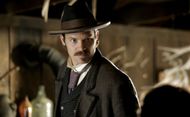David Milch's Deadwood was celebrated as one of the most daring shows on TV, known for its raw take on life in the untamed Old West. When the show took off, HBO unexpectedly decided to cancel it, which stirred up a lot of controversy. It ran for three seasons and hooked viewers with its characters, dialogue, and storytelling that broke the mold.
But behind the scenes, things were getting tense, and the show ended on a sour note that still bothers fans and critics. When the show got canceled in 2006, it caught the cast and the audience off guard. Milch, known for his creative style, had plans for the storyline and hoped for a fourth season to wrap up loose ends.
Things changed at HBO, and they started focusing less on art-driven shows like Deadwood and more on mainstream ones. A May 30, 2019, article from Vulture pointed out that Milch's perfectionism and rising costs also influenced the
David Milch's vision for Deadwood vs. HBO's bottom line

David Milch'sartistic style was a huge plus but a downside for the show. His dedication to creating historically accurate dialogue and storylines made the production process slow and tough. Vulture reported that Milch would rewrite scenes just hours before they were filmed.
Former producer Gregg Fienberg mentioned in the Vulture publication:
"He pushed the cast and crew to their limits."
This kind of precision stretched out production timelines and drove up costs, something HBO found increasingly difficult to justify. By the third season, the network had poured millions into the series. Even though it received rave reviews, the network had a harder time proving its worth compared to other breakout hits like The Sopranos and Six Feet Under.
An unnamed HBO executive shared with The Hollywood Reporter back in June 2019:
"We loved Deadwood, but we had to be practical."
Milch'Milch's weren'weren'thed yet. He was already drafting scripts for a fourth season to explore the show'sshow'sical drama and moral dilemmas more. HBO, concerned about rising costs and falling viewership, decided to cancel it.
HBO's case for canceling the cult favorite Deadwood

HBO's HBO'sion to cancel Deadwood wasn'twasn'tabout the money. According to an article from Vulture, the network was shifting towards shows that could attract a wider audience.
Deadwood spoke to a specific group of fans, and HBO executives worried it wasn'twasn'tar enough to cover the rising costs. Moreover, the TV scene was evolving. HBO started leaning more towards shows like Entourage and Big Love, which were cheaper to produce.
A Variety report from March 2020 said this internal change put Milch in a tough spot.
“There was a belief that shows like Deadwood were unsustainable in the new market,” said an HBO insider.
In a 2020 interview with Rolling Stone, Milch commented on HBO's HBO'sion to cancel the show, saying:
“I felt like a part of my soul was being ripped out when they canceled it.”
Fans got some closure in 2019 with the release of Deadwood: The Movie on HBO. The cancellation Is a reminder of how unpredictable TV can be.
Stay tuned to Soap Central for updates and insights on Deadwood's legacy.
